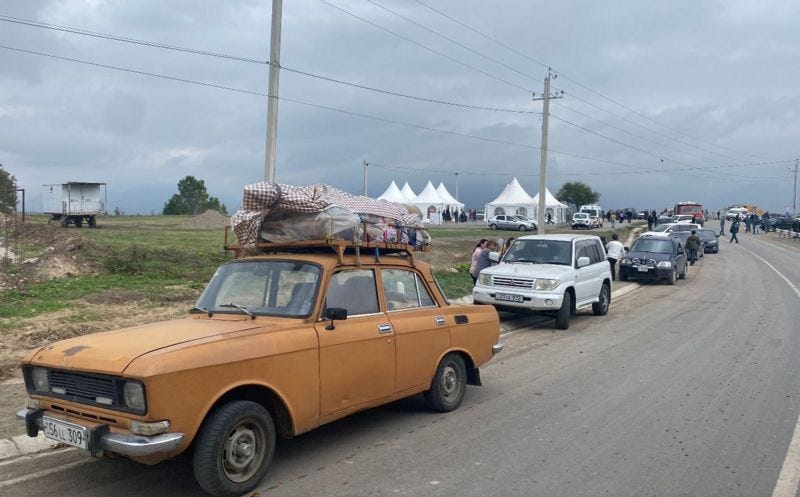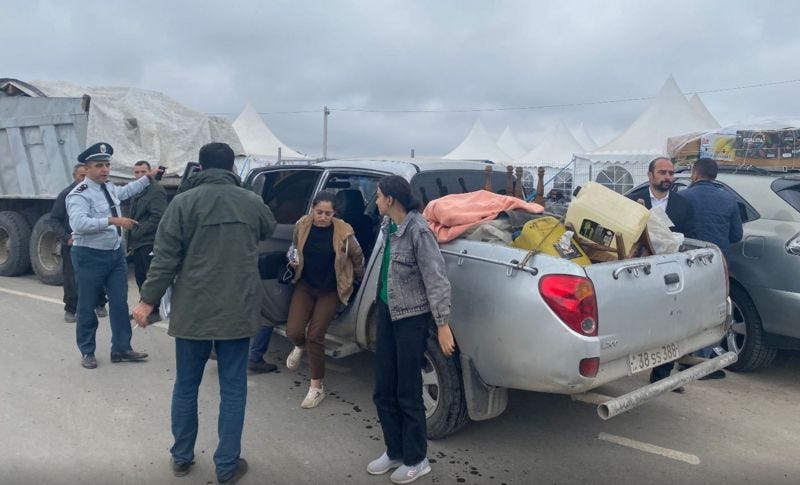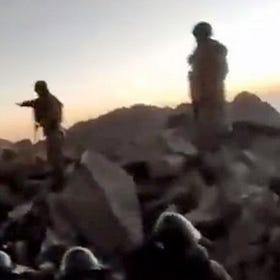"Give us a new planet”: tens of thousands of Armenians flee Nagorno-Karabakh
BBC Russian reporters have been to the southern Armenian town of Goris and up to the border with Azerbaijan to hear the stories of Karabakh Armenians fleeing the uncertainty of life under Baku.
By Ilya Barabanov and Nataliya Zotova, in Kornidzor, Armenia.
Some 50,000 Armenians have fled Nagorno-Karabakh since Azerbaijani military forces and Russian peacekeepers opened the border crossing into Armenia on Saturday. BBC Russian has been to southern town of Goris and up to the border to meet some of the lost and exhausted new arrivals and hear their stories.
The road from the Azerbaijani border into Armenia is flooded with a seemingly endless stream of people leaving Nagorno-Karabakh.
As we make the half-hour drive from the nearest town, Goris, we pass cars, trucks, and even a tractor carrying families and their belongings.
We see new vehicles, an old Soviet-era Moskvich car, and at one point a Kamaz truck loaded with mattresses, beds, doors and on top of it all, the poignant sight of a man in his fifties with a large stuffed panda sat next to him.
On the outskirts of the village of Kornidzor, a few kilometres from the Armenian-Azerbaijani border, seven tents have been set up to register the new arrivals.
On the horizon are the mist-covered mountains of Karabakh with the border running through them. Every few minutes more cars appear out of the mist from the Karabakh side. Border guards allow people to pass through in small groups, and police officers approach each new car. If there are children or elderly people inside, they hand out bottles of water and packs of Choco Pie cookies.
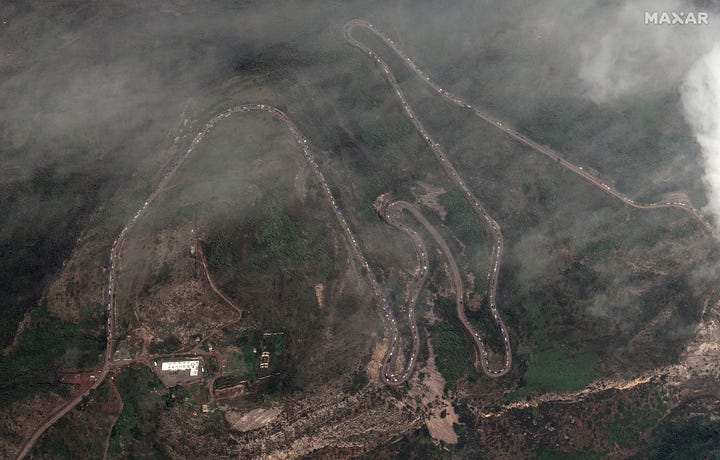

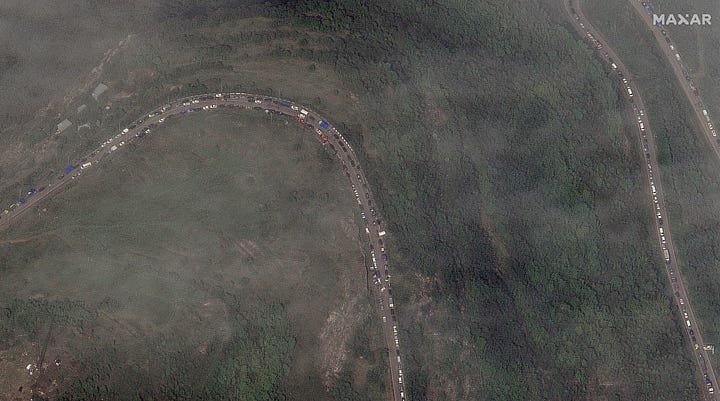
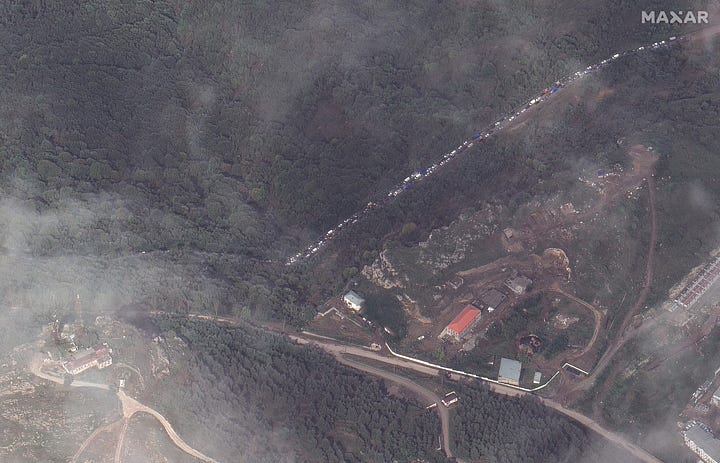
There is no precise data on how many people are waiting in line to leave Karabakh. Some speak of hundreds, while others say thousands of vehicles are queuing up on the Azerbaijani side of the border. Azerbaijani and Armenian Telegram channels have published photos of an epic traffic jam with cars lined up four abreast all slowly heading out of Karabakh towards Armenia.
On the approach to the tent camp, there is also a significant traffic jam, this time from the Armenian side. These are local Armenians who have come to the border to wait for loved ones trying to make their way out of Karabakh.
Journalists are allowed into the camp, but they are strongly requested not to try to interview the refugees because so many people are exhausted after months of blockade, combat operations, and a long journey.
Some of the refugees are being registered here, while others are sent on to another resettlement registration centre that has opened in Goris. This small town, with a population of barely over 20,000 people, is dealing with growing numbers of refugees.
At least 5000 people arrived in the first two days after the border was opened, and the numbers were continuing to soar. It’s now almost impossible to find a hotel room there. People with relatives in Armenia, leave immediately to join them, while some others are being sent on to other Armenian provinces. But the majority of the new arrivals are still in Goris for now.
Occasionally, a representative of the Armenian government's crisis management working group in Karabakh, Vardan Sarkisyan, steps out of one of the tents and reads out dry government updates for the assembled media: "The Syunik and Vayots Dzor regions were the first to accept resettled people.
Currently, people from Karabakh are arriving in their own vehicles or by bus. The duration of the humanitarian centre’s operation is unknown. The Armenian government is ready to accept and accommodate all those who wish to come from Karabakh."
Although Azerbaijan’s lighting operation to retake control of Karabakh was all but over by 20 September it was only in the afternoon of the 24th that it finally became clear that Azerbaijan would allow Karabakh Armenians to leave.
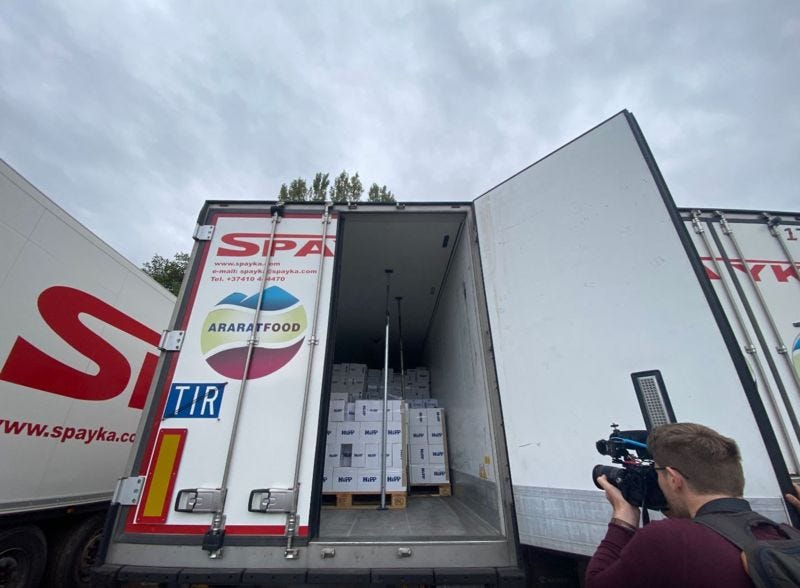
When we arrived in Goris on the morning of September 24, there were dozens of trucks with humanitarian aid for Karabakh parked up near the bridge over the Vararak River. The truck drivers told the BBC they had been waiting at the border for two months but had not been allowed through. They showed us what they were hoping to bring in: flour, sugar, medicine, baby food. "We'll have to leave all this here. We can't take it back to Yerevan," they said. "Who is not letting us through? We need to ask the Putin government. Russians or Azerbaijanis? Both."
The trucks were finally turned away from the border in the middle of the day on 24 September. A couple of hours later, we heard that the first groups of refugees were already starting to cross the border towards Goris.
As they had done during the previous escalations in the fighting in 2016 and 2020, the first forced migrants made their way to the largest hotel in the city - the ‘Goris’ hotel, where they were put up for the night and provided with hot meals.
When we visited, the hotel lobby was already filling up -- elderly people on crutches, people in wheelchairs, and children, fixated by the big brightly lit aquarium in one corner. There are bags of clothing piling up near the reception desk - whatever people managed to take with them.
"We left Nagorno-Karabakh today,” says an elderly woman called Veronika. “We are from Martakert, and from now on, we will be here. The Azerbaijanis don't need us."
Veronika tells us that after the shelling began, she and her relatives took shelter at the airfield on the outskirts of Stepanakert, where the Russian peacekeepers are based. She says she didn't see any Azerbaijani soldiers herself but heard drones in the sky and the sound of combat aircraft: "Today, the first column left, and we were in it. If anyone wants to stay with the Azerbaijanis, they can stay, but no one will want to."
Veronika spent several days at the airfield, which she says was turned into a refugee camp for civilians. She says that it was thanks to the Russian peacekeepers that people were safe, and that they were able to leave Karabakh.
Vage Rubenovich left Askeran , a town north-east of Stepanakert. He tells us how hard it was to survive the blockade and to have no bread for months. He says he is grateful to the Russian peacekeepers for giving people another three years of peaceful life after the 2020 war. But all that has come to an end now, he аdds.
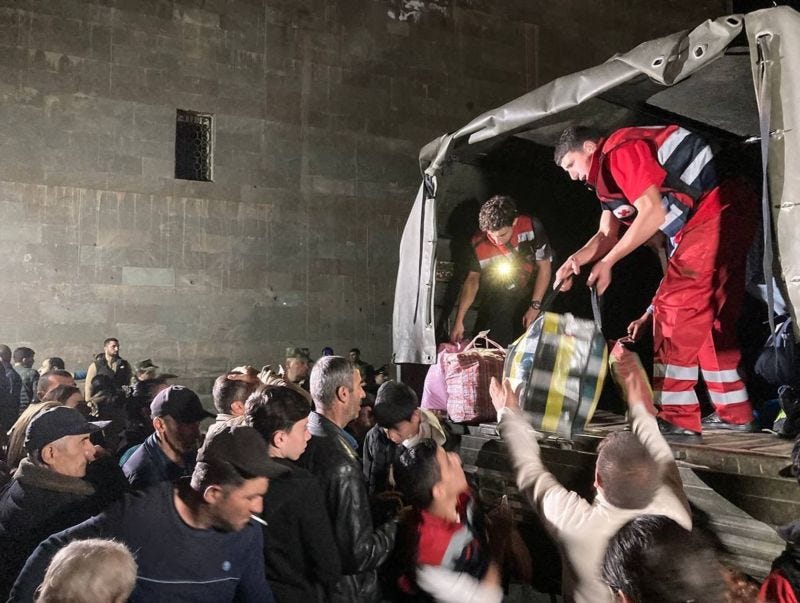
Many refugees refuse to speak with journalists, while others just say a few words: "We left as a family of six, they bombed us, our glucose levels and our blood pressure went sky high.”
Tatiana Oganesyan, the director of the "Doctors and Volunteers of Armenia" foundation, which is currently trying to help the new arrivals, says that some of her relatives from Karabakh have not been able to leave Stepanakert yet, and she has not been able to find out where some of them are.
"They are living through their fourth war,” she says. "Their husbands and sons are risking their lives for the fourth time. I have no moral right to tell them: stay there, die again. It's impossible to live like that. We need to find a new planet to live on.”
Oganesyan tells us that many of the new arrivals are suffering from severe stress after months under blockade, often without vital medications.
“Many have been beaten, and many have had to sleep rough in the woods,” she says. "People with diabetes did not have their insulin. Children were born with oxygen deprivation. Some children arrived malnourished. We give each of them a small kit - a first aid kit with over-the-counter medicines, but any healthcare system would struggle with such stress."
A volunteer centre has been set up in the building of the Goris Drama Theatre. Russian peacekeeping trucks bring the personal belongings of the displaced people from Stepanakert airfield, and local 14-15-year-old teenagers, after a brief briefing, don Red Cross vests and work as volunteers, helping to carry the elderly or unload the same trucks with their belongings.
Although some refugees are grateful to the Russian peacekeepers for helping them leave Karabakh, it’s clear that among both local residents and new arrivals, overall attitudes towards a peacekeeping force that failed to stop another round of fighting, are much less positive than they were after the last war in 2020. And this also applies to attitudes towards Russians in general.
When the refugee registration centre in the theatre building first opened, a BBC correspondent approached a local resident with this question, not yet understanding what this building was.
The conversation went as follows:
Local Resident: "Who are you?"
Correspondent: "I’m a BBC journalist."
Local Resident: "But you're Russian?"
Correspondent: "Yes."
The man sighed deeply and didn't say another word.
BBC Russian has deployed teams to cover this story both in Azerbaijan and Armenia. You can read the report from Azerbaijan below.
Read the Russian version of this story here.
Edited by Jenny Norton.
Military trophies and fearful refugees: A glimpse inside Nagorno-Karabakh
By Olga Ivshina, in Shusha, Azerbaijan. Azerbaijan's military has paraded heavy weapons captured in Nagorno-Karabakh, amid warnings thousands of civilians are without shelter after the surrender of Armenian separatists. In the courtyard of a military base in the …
Massacre on the border: Could allegations of an Azerbaijani war crime in September derail Karabakh peace efforts?
Additional reporting by Paul Myers. Accusations of war crimes continue to overshadow attempts to find a lasting settlement to Azerbaijan and Armenia’s long-running dispute over Nagorny Karabakh. Claims by Armenia that Azerbaijani troops shot dead at least eight Armenian POWs during a flare up in September, are the latest in a grim toll of unresolved kill…





